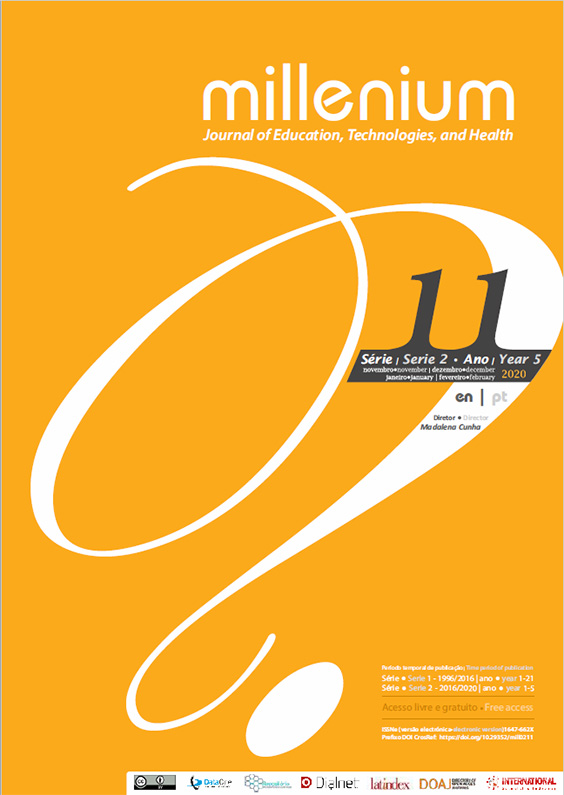A Critical thinking to build creative solutions
ProLearn4ALL project contributions
DOI:
https://doi.org/10.29352/mill0211.01.00255Keywords:
Problem-based learning, Critical thinking, Higher education, ProLearn4ALL projectAbstract
Introduction: The Learning Products for ALL (ProLearn4ALL) is a project which aims to make children aware of difference in the primary schools, with accessible multiform products, developed by higher education students. This process, which is founded on Problem Based Learning (PBL) methodologies, has as its main phases: the conceptualization of products and prototypes; pilot test; revision, reformulation and validation of products; and, finally the production and dissemination of a pedagogical kit.
Objectives: The paper presents the PBL methodology as an active process used to develop critical thinking through the use of proposed prototype solutions to solve non-routine problems.
Methods: Applying PBL methodology, the process started with the theoretical contextualization of the four main domains of disability (hearing, intellectual, motor, visual) and with the creation of prototypes, by students in the areas of Social Sciences and Education, to highlight the characteristics of each domain. Subsequently, Arts and Design students were asked to create playful and accessible products, based on the prototypes that were previously built.
Results: Students were challenged to put themselves in the places of people with disability by using specific restrictions, created as thematic introductions to the proposed challenges. In this sense, the products were made with higher level of awareness, as students were simultaneously producers and users.
Conclusion: The multiple reflections, during and after the production of the resources, allowed a constant process of research, validation and exclusion of solutions to occur, which progressively led to the construction of the final Pedagogical Kit.
Downloads
References
American Psychiatric Association (2014). DSM - 5 – Diagnostic and Statistical Manual of Mental Disorders. Virginia: APA.
Bishop, E., & Bittner, M. (2018). Pedagogy With Purpose: Engaging students with foreign policy issues. Childhood Education, 94(4), 14-21.
Campagnaro, M. (2019). Do touch! How Bruno Munari's picturebooks work. Rivista di Storia dell‘Educazione, 6 (1), 81-96.
Edmonds, W. A., & Kennedy, T. D. (2017). An Applied Guide to Research Designs: Quantitative, Qualitative, and Mixed Methods. Los Angeles: SAGE Publications, Inc.
Ellis, T., & Levy, Y. (2008). Towards a Framework of Problem-Based Research: A Guide for Novice Researchers. Informing Science: The International Journal of an Emerging Transdiscipline, 11, 17-33
Guerreiro, A. (2018). Dicionário de Conceitos, Nomes e Fontes para a Inclusão: Humanizar a Vida em Cidadania e no Prazer Solidário de Existir. Almada: EDLARS - Educomunicação e Vida.
Hallinger, P., & Bridges, E. M. (2016). A systematic review of research on the use of problem-based learning in the preparation and development of school leaders. Educational Administration Quarterly, 1-34.
Liebowitz, D.; González, P.; Hooge, E., & Lima, G. (2018). OECD Reviews of School Resources: Portugal 2018, OECD Reviews of SchoolResources. Paris: OECD Publishing
Mantey, E. (2017). Discrimination against children with disabilities in mainstream schools in Southern Ghana: Challenges and perspectives from stakeholders. International Journal of Educational Development, 54, 18–25
McDaniels, M., & Skogsberg, E. (2017). The scholars we need: Preparing transdisciplinary professions by leveraging the scholarship of practice. New Directions for Higher Education, 178, 71-83.
Okongo, R.; Ngao, G.; Rop, N., & Nyongesa, W. (2015). Effect of Availability of Teaching and Learning Resources on the Implementation of Inclusive Education in Pre-School Centers in Nyamira North Sub-County, Nyamira County, Kenya. Journal of Education and Practice, Vol.6, No.35, 132-141.
Paul, R., & Elder, L. (2020). The miniature guide to Critical Thinking: concepts and tools. United Kingdom: Rowman & Littlefield.
Pedro, N., & Matos, J. F. (2015). Salas de Aula do Futuro: novos designs, ferramentas e pedagogias. In A. S. Ribas, D. Marangon, J.F. Matos & N. Pedro (Org.) Ensinar a aprender! O saber da ação pedagógica em práticas de ensino inovadoras – Atas digitais do III Seminário Nacional Investigando Práticas de Ensino em Sala de Aula e I Seminário Internacional de Práticas Pedagógicas Inovadoras, 15-29.
Pereira, H. (2017). Educação: Cenários orientadores da aprendizagem do futuro. REAeduca, Revista de Educação para o Século XXI, 3.
Skoog, C. (2017). Leaving no child with disability behind. Salud Pública de México, 59, 4, 349-350.
Ulger, K. (2018). The Effect of Problem-Based Learning on the Creative Thinking Disposition of Students in Visual Arts Educations. The Interdisciplinary Journal of Problem-Based Learning, 12(1), article 10.
Yew, E. H. J., & Goh, K. (2016). Problem based learning: An overview of its process and impact on learning. Health Professions Education, 2, 75-79.
Downloads
Published
How to Cite
Issue
Section
License
Copyright (c) 2020 Millenium - Journal of Education, Technologies, and Health

This work is licensed under a Creative Commons Attribution 4.0 International License.
Authors who submit proposals for this journal agree to the following terms:
a) Articles are published under the Licença Creative Commons (CC BY 4.0), in full open-access, without any cost or fees of any kind to the author or the reader;
b) The authors retain copyright and grant the journal right of first publication, allowing the free sharing of work, provided it is correctly attributed the authorship and initial publication in this journal;
c) The authors are permitted to take on additional contracts separately for non-exclusive distribution of the version of the work published in this journal (eg, post it to an institutional repository or as a book), with an acknowledgment of its initial publication in this journal;
d) Authors are permitted and encouraged to publish and distribute their work online (eg, in institutional repositories or on their website) as it can lead to productive exchanges, as well as increase the impact and citation of published work
Documents required for submission
Article template (Editable format)





